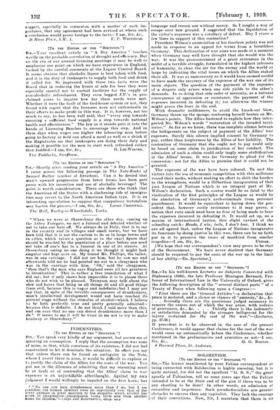INDEMNITIES.
(To THE EDITOR or THE " SPECTATOR.") Ste,—You speak eery kindly of my argument, but accuse me of ignoring an assumption. I reply that the assumption was none of mine, so that, while conscious of its existence, I did not feel conetrained to let it dominate the situation. In effect you say that unless there can be found an ambiguity in the Note, where I assert there is none, it would be difficult to explain or to justify the claim of the Allies for tine costs of the war. You pint me in the dilemma of admitting that my reasoning must he at fault or of contending that the Allies' Reim to war expenses is an unjustifiable afterthought. Against my own judgment I would willingly be impaled on the first horn; but • "No one can hate drunkenness more than I do, but I am confident tbd Inmanintellect owes ito maperiority ore: that of the lower animals in great measure to the sternums which alcohol has sham to imagination—imagination being little else than another name for illusenn."—(.lips and Sanctuaries. ohms.
language and reason are without mercy. So I sought a way of escape over new ground. I suggested that the liquidation of the victor's expenses was a corollary of defeat. May I crave a few lines in support of this contention?
President Wilson's enunciation of his fourteen points was not anode in response to an appeal for terms from a breathless Germany. This declaration of war aims was made at a moment when Germany may well have thisught that she would win the war. It was the pronouncement of a great statesman in the midst of a terrible struggle, formulated in the highest interests of humanity, to clear the air for the enemy and the world at large by indicating the vital issues on which the Allies staked their all. It was as unnecessary as it would have seemed sordid to have made the recovery of tine expenses of the war one of its main objects. The question of the payment of the expenses of a dispute only arises when one side yields to the other's demands. In so doing that side cedes of necessity, as a natural consequence of aggression or resistance, the payment of the expenses incurred in defeating it; for otherwise the winner might prove the loser in the end. '
With dramatic suddenness, to avoid the knock-out blow, Germany threw up the sponge, confessing herself beaten on Mr. Wilson's points. The Allies hastened to explain how they inter- preted Mr. Wilson's words " restoration of the invaded terri- tories." So far as we know, there was complete silence between the belligerents on the subject of payment of the Allies' war expenses. Surely this silence implied consent by Germany to pay, rather than forgiveness by the Allies of her liability. The contention of Germany that she ought not to pay could only be based on some claim to justification of her conduct. The admission of such a claim could only imply some stultification of the Allies' terms. It was for Germany to plead for the concession: not for the Allies to premise that it could not be granted.
The expenses of the war have been colossal. To east the victors into the sea of economic competition with this millstone round their necks, without making an effort to shift the burden to the wrongdoers, would be a Gilbertian inauguration of that just League of Nations which is an integral part of Mr. Wilson's declaration. Such a course would be ns fatal to the vindication of the first principles of the League as would be the absolution of Germany's arch-criminals from personnl punishment. It would be equivalent to laying down the pre- cedent that, however costly resistance to it may prove, a nation that runs amok need have no fear of being made to bear the expenses incurred in defeating it. It would set up, as a maxim of international justice, this alight variant of the schoolboy catch: Heads, I win; tails, I don't lose. I think we are all agreed that, unless the League of Nations inaugurates its functions by doing justiceln this war, there can be no faith put in it to preserve the races of mankind from similar [We, hope that our correspondent's view may prove to be that of the Government. We have never doubted that Germany should he required to pay the costs of the war up to the limit of her ability.—En. Spectator.]


































 Previous page
Previous page